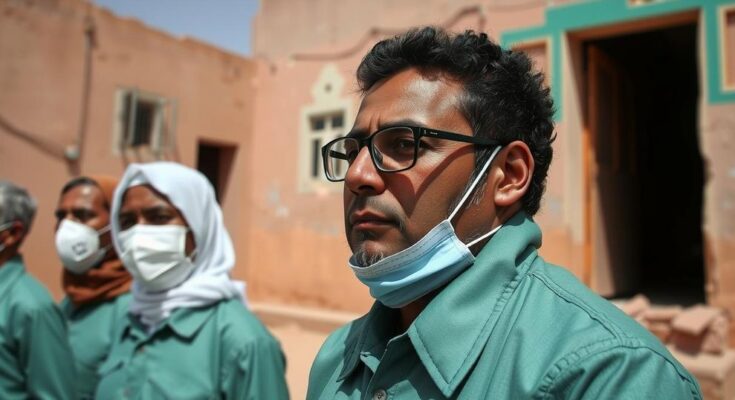Four activists in Morocco, including Amazigh leader Said Ait Mahdi, are on trial for criticizing the government’s slow earthquake recovery efforts following the September 2023 disaster. Many victims remain in makeshift tents during winter, exacerbating frustrations with aid distribution. While the government announced a reconstruction plan, activists claim that many are receiving insufficient assistance due to bureaucratic barriers and alleged corruption.
Four Moroccan activists, including noted Amazigh leader Said Ait Mahdi, are currently facing trial after publicly criticizing the government’s slow response to post-earthquake reconstruction efforts following the September 2023 disaster. Ait Mahdi, who has been in custody since December 23, stands accused of defamation, insult, and spreading misinformation, according to his legal representative, Mohamed Nouini. Meanwhile, three other activists tied to the El-Haouz Earthquake Victims’ Coordination face charges for insulting public officials but are free pending their upcoming court appearance on January 6.
The case stems from complaints lodged by local officials who claimed their reputations were harmed by social media statements made by the activists. The escalation of legal actions against those who question the government’s recovery strategies has raised concerns about stifling free expression. “We condemn the dangerous escalation of trials and prosecutions targeting bloggers and activists including Said Ait Mahdi and his fellows,” stated the Moroccan Association for the Support of Political Prisoners.
Despite a year having passed since the earthquake displaced over 500,000 individuals in the Atlas Mountains, many families continue to endure harsh winter conditions while residing in makeshift tents. Recent social media videos highlighted the dire situation, showing snow-covered camps where children shivered from the cold. The government had proposed a $12 billion reconstruction plan, which included direct financial support for severely damaged homes. However, activists argue that the actual aid is significantly lower than promised and that many families have been unjustly excluded due to bureaucratic obstacles.
Last month, dozens of families protested outside the parliament building, demanding accountability during a session led by Prime Minister Aziz Akhannouch. This focal event showcased the growing frustration stemming from the perceived disparity between governmental assurances and the lived experiences of affected individuals. In the face of these challenges, the opposition Progress and Socialism Party has urged for an investigative mission to assess the transparency and efficiency of the recovery efforts, especially amid rising allegations of corruption involving the local distribution of funds.
In December, Morocco’s Interior Minister, Abdelouafi Laftit, revealed that his ministry had initiated an investigation, resulting in at least one official being found guilty of soliciting bribes to expedite the allocation of reconstruction funds. As thousands remain vulnerable to the elements in makeshift camps, the urgency for prompt governmental responses has only intensified.
A devastating earthquake struck Morocco in September 2023, displacing over 500,000 individuals, primarily in the mountainous Atlas region. The government’s subsequent response faced criticism for its perceived inadequacy, leading to delays in aid distribution. As winter approached, many families still resided in tents, suffering from harsh weather conditions while awaiting promised government support. The situation exacerbated social tensions, leading to the activism and subsequent trial of those who spoke out against the slow recovery efforts.
The ongoing trial of Moroccan activists highlights significant tensions between citizens advocating for accountability in earthquake recovery efforts and governmental responses perceived as insufficient. The case against these outspoken individuals raises alarm regarding freedoms of expression in Morocco. Meanwhile, the plight of earthquake victims remains critical, with ongoing demands for transparency in aid distribution amidst troubling allegations of corruption. As the harsh winter continues, the call for timely action and genuine support for displaced families becomes increasingly urgent.
Original Source: www.newarab.com




